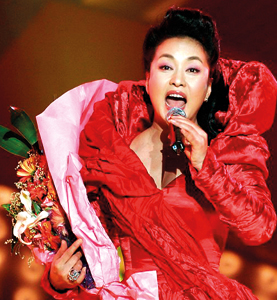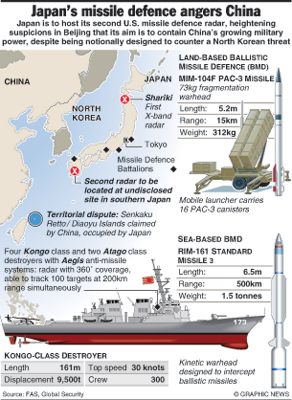Sunday Times 2
New President-elect of China grew up in a cave
China’s new president Xi Jinping was officially introduced to the nation this week, but to many Chinese citizens it is the face of his glamorous pop star wife that will appear far more familiar.†The Communist Party leader-elect and powerful military chief is married to Peng Liyuan, the syrup-voiced megastar of popular Chinese folk music.

The Peony Fairy: Ms Peng had graced television screens in the world's most populous country for more than a decade, her honeyed tones punctuating TV shows and Communist Party rallies
Nicknamed the Peony Fairy, Ms Peng, 49, had graced television screens in the world’s most populous country for more than a decade, her honeyed tones punctuating state-run TV shows watched by hundreds of millions of people.
Ms Peng has become China’s first high-profile political spouse since Jiang Qing, the late wife of Chairman Mao Zedong. †Her huge success in the entertainment industry has run alongside her staunch loyalty to the Communist Party.
She joined the People’s Liberation Army aged 18 and rose to the rank of major-general, a post she still holds.
But when her superiors discovered her talent for singing, she began touring army bases serenading troops in a programme designed to boost morale.
From there her rise to fame was meteoric. She is best known for performing at CCTV’s New Year’s Gala – a show watched by hundreds of millions of people throughout China – almost every year since its inception in 1982.
Almost all of her songs are in praise of the Communist Party and frequently appears on state television to sing propagandist ballads with names including Plains of Hope and People From Our Village.
In June 2011, she was even appointed World Health Organisation Goodwill Ambassador for HIV/Aids and tuberculosis.
She has also shied away from appearing in public with her husband or talking about their relationship until recently, fuelling speculation that she may take a more active role in his presidency than any of her predecessors.
In a rare interview in 2007, she told a state-run magazine: ‘When he comes home, I’ve never thought of it as though there’s some leader in the house.†‘In my eyes, he’s just my husband. When I get home, he doesn’t think of me as some famous star. In his eyes, I’m simply his wife.’
But while hers is still one of the most famous faces in the country, comparatively little is known of her husband, a man who spent most of his teens living in a cave, labouring in the fields of one of China’s poorest regions.
He is the son of Communist revolutionary general Xi Zhongxun, a comrade of Chairman Mao.But when he was in his teens, his father fell out with the Chairman and was sent to prison.†Xi was exiled to a far-flung, rural community of Liangjiahe, in Shaanxi province, where he lived in cave-dwellings and was forced to labour in the fields. Little more than 100 miles from Beijing, it is one of China’s poorest regions.

Get used to this face: Xi's inaugural address as the country's new leader was broadcast on giant screens across China. Here, above a McDonald's in Beijing
The family lived like peasants in a cave-like house carved out of the yellow rock formations that surrounded the village.†He is quoted as saying no problems he has encountered in political life compared to the hardship he suffered as a young man.
But he immersed himself in local politics and soon rose the ranks before today assuming the top posts in the Communist Party and the powerful military in a political transition unbowed by scandals, a slower economy and public demands for reforms.
Xi was introduced as the new party general secretary at Beijing’s Great Hall of the People a day after the close of a week-long party congress that underlined the communists’ determination to remain firmly in power.
He and the six other men who will form China’s new collective leadership, all dressed in dark suits, walked in line onto the red-carpeted stage.†Xi’s appointment as chairman of the military commission, announced by the state Xinhua News Agency, marked a break from the recent tradition of retiring leaders holding onto the post for a transitional period to extend their influence.
It meant outgoing leader Hu Jintao would relinquish all positions of power, giving Xi broader leeway to consolidate his authority.
At ease in front of people and with colleagues, Xi takes over the party leadership from the stiff, technocratic Hu, and is expected to assume the largely ceremonial presidency in March.†The ascent of Xi and Li, the premier-in-waiting, represents a generational change.
Though they spent their youths labouring on farms, their university years and early careers took place when China was casting off the planned economy and turning to the free market and to the West.
They are thought to be more open to new ideas than their predecessors, but nonetheless bound by China’s consensus-oriented politics.
The outgoing Hu oversaw a decade of turgid economic growth and urban development and tried to make concern for ordinary people the hallmark of his tenure, but he also will be remembered for harshly stifling dissent and rolling back civil liberties.
At the same time, increased social freedoms have created a generation of Chinese who are more aware of their rights and more vocal about demanding them.
© Daily Mail, London
Follow @timesonlinelk
comments powered by Disqus


















